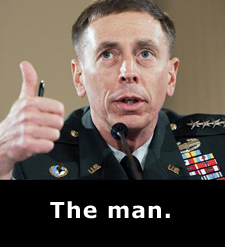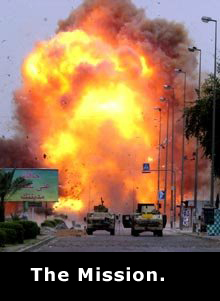About 17 more U.S. soldiers were killed this week in Bush’s splendid little war. They were no relation to Dubya,  Cheney, or anyone important, so not to worry. I had to turn my local newspaper upside-down and shake it to find any mention of the deaths – they were buried (with full military honors) in the text of an article about some other grisly aspect of the Iraq enterprise, which itself appeared on the back page of the paper’s main section. (It’s kind of a general news section… though not really. These local papers are all about local news now, with a smattering of national and international stories dropped into the cracks, plus Krauthammer’s column and other useless bilge… then there’s the “local” section.) The 17 dead don’t fit the narrative, so they must not be emphasized… or perhaps even reported, as in the case of the Winter Soldier testimonies, which never found their way into my local paper. No, this week was handed over to general Petraeus and ambassador Crocker, who offered their blandly abstruse portrait of what’s happening with Operation Iraqi Fiefdom. It’s a kind of pointillist portrait, as Seurat-like mosaic of microscopic “metrics” worked into expansive-sounding abstractions like “battlefield geometry” and strategic frameworks. Step back a few paces and you can see uncle Reagan’s smiling visage in the dots… or a death’s head, depending on the angle.
Cheney, or anyone important, so not to worry. I had to turn my local newspaper upside-down and shake it to find any mention of the deaths – they were buried (with full military honors) in the text of an article about some other grisly aspect of the Iraq enterprise, which itself appeared on the back page of the paper’s main section. (It’s kind of a general news section… though not really. These local papers are all about local news now, with a smattering of national and international stories dropped into the cracks, plus Krauthammer’s column and other useless bilge… then there’s the “local” section.) The 17 dead don’t fit the narrative, so they must not be emphasized… or perhaps even reported, as in the case of the Winter Soldier testimonies, which never found their way into my local paper. No, this week was handed over to general Petraeus and ambassador Crocker, who offered their blandly abstruse portrait of what’s happening with Operation Iraqi Fiefdom. It’s a kind of pointillist portrait, as Seurat-like mosaic of microscopic “metrics” worked into expansive-sounding abstractions like “battlefield geometry” and strategic frameworks. Step back a few paces and you can see uncle Reagan’s smiling visage in the dots… or a death’s head, depending on the angle.
For those of you who might have thought, on the basis of their recent contrition over pre-war lapses, that the major news organizations learned a lesson or two, prepare to be disappointed. The same dynamic is still at work – no one wants to call out the sainted general, particularly since the political class is fawning over him. So the media follow suit. Brian Williams’ interview with Petraeus was a good example. Williams played footage of Saddam’s statue being pulled down – a public relations exercise that was long ago debunked as such, with the square having been cordoned off to the general public and populated with some of Chalabi’s people. To Williams, apparently, this is still emblematic of an outpouring of gratitude among Iraqis for their liberation, and he asked the general, in a voice heavy with emotion, “What happened?” Petraeus met this slow-ball with some boilerplate about how some Iraqis had “come to see” Americans as enemies and occupiers, that certain areas had to be “re-liberated”, etc. Always, we are portrayed as a force for good, occasionally falling victim to misperceptions, often as the result of our own well-meaning blunders.
In Iraq, though, the reality is quite different. It’s not hard to discern, really. A look at Nir Rosen’s work, or that of Patrick Cockburn, is instructive. The country is now basically segregated along sectarian and ethnic lines, ruled by militias, and haunted by the prospect of more conflict  to come. The conclusion that we have, through our actions, destroyed that country and brought about the deaths of hundreds of thousands of its citizens cannot be obscured by technocratic happy talk. To say that matters have improved in recent months is like saying that murder and ethnic cleansing brings peace. The peace of the grave, perhaps… but nothing we should claim as a success. In any case, Petraeus and Crocker can only speak to how well the enterprise is going, not whether the enterprise is something we should be engaged in at all. Their charts, graphs, and statistics help to feed the general misimpression that the administration wants us all to focus on – that we are staying in Iraq so we can help ordinary Iraqis. The truth is quite the opposite… we affect to care about ordinary Iraqis so that we can stay in Iraq. By what the general and the ambassador say, there is apparently no circumstance (things going badly, things going well) that would allow us to leave – so it’s reasonable to conclude that the point of the whole business is to stay… and stay permanently.
to come. The conclusion that we have, through our actions, destroyed that country and brought about the deaths of hundreds of thousands of its citizens cannot be obscured by technocratic happy talk. To say that matters have improved in recent months is like saying that murder and ethnic cleansing brings peace. The peace of the grave, perhaps… but nothing we should claim as a success. In any case, Petraeus and Crocker can only speak to how well the enterprise is going, not whether the enterprise is something we should be engaged in at all. Their charts, graphs, and statistics help to feed the general misimpression that the administration wants us all to focus on – that we are staying in Iraq so we can help ordinary Iraqis. The truth is quite the opposite… we affect to care about ordinary Iraqis so that we can stay in Iraq. By what the general and the ambassador say, there is apparently no circumstance (things going badly, things going well) that would allow us to leave – so it’s reasonable to conclude that the point of the whole business is to stay… and stay permanently.
We’re down to a basic policy question… the Clash question, if you will: Shall we stay or shall we go? In a democracy, that should never be left to generals or diplomats.
luv u,
jp
